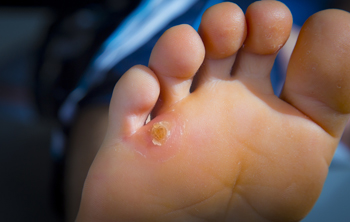Where Are Seed Corns Found?
Tuesday, 23 August 2022 00:00
Corns can cause severe pain and discomfort. They are defined as small patches of hardened skin that develop as a result of excess friction typically from wearing shoes and socks that are too tight. There are certain medical conditions that may lead to corns. Patients who have hammertoe and bunions may find that corns develop on top of the extended joints. There are three categories of corns consisting of hard, soft, and seed corns. If you notice a corn on the bottom of your foot, it most likely is a seed corn. The medical term for this type of corn is heloma milliare and they develop due to dry skin. Other characteristics of a seed corn can include multiple corns in one area, and they may appear circular and smaller than other types of corns. Soft corns are found between the toes and remain moist from the sweat that is found there. A hard corn can develop on the side of the pinky toe or on top of the other toes from excess friction. If you have corns on your feet, please seek the expert advice of a podiatrist who can offer you the correct treatment options.
Corns can make walking very painful and should be treated immediately. If you have questions regarding your feet and ankles, contact Dr. Robert Graser of Graser Podiatry and Bunion Surgery Institute. Our doctor will treat your foot and ankle needs.
Corns: What Are They? And How Do You Get Rid of Them?
Corns are thickened areas on the skin that can become painful. They are caused by excessive pressure and friction on the skin. Corns press into the deeper layers of the skin and are usually round in shape.
Ways to Prevent Corns
There are many ways to get rid of painful corns such as:
- Wearing properly fitting shoes that have been measured by a professional
- Wearing shoes that are not sharply pointed or have high heels
- Wearing only shoes that offer support
Treating Corns
Although most corns slowly disappear when the friction or pressure stops, this isn’t always the case. Consult with your podiatrist to determine the best treatment option for your case of corns.
If you have any questions please feel free to contact our office located in Boerne, . We offer the newest diagnostic and treatment technologies for all your foot and ankle needs.
Featured Articles
- July 2024
- June 2024
- May 2024
- April 2024
- March 2024
- February 2024
- January 2024
- December 2023
- November 2023
- October 2023
- September 2023
- August 2023
- July 2023
- June 2023
- May 2023
- April 2023
- March 2023
- February 2023
- January 2023
- December 2022
- November 2022
- October 2022
- September 2022
- August 2022
- July 2022
- June 2022
- May 2022
- April 2022
- March 2022
- February 2022
- January 2022
- December 2021
- November 2021
- October 2021
- September 2021
- August 2021
- July 2021
- June 2021
- May 2021
- April 2021
- March 2021
- February 2021
- January 2021
- December 2020
- November 2020
- October 2020
- September 2020
- August 2020
- July 2020
- June 2020
- May 2020
- April 2020
- March 2020
- February 2020
- January 2020
- December 2019
- November 2019
- October 2019
- September 2019
- August 2019
- July 2019
- June 2019
- May 2019
- April 2019
- March 2019
- February 2019
- January 2019
- December 2018
- November 2018
- October 2018
- September 2018
- August 2018
- July 2018
- June 2018
- May 2018








